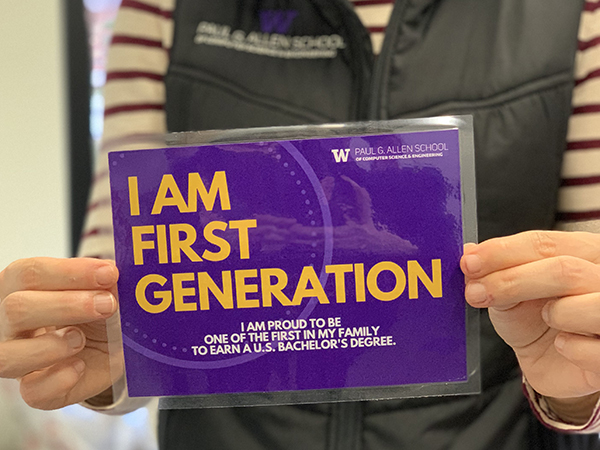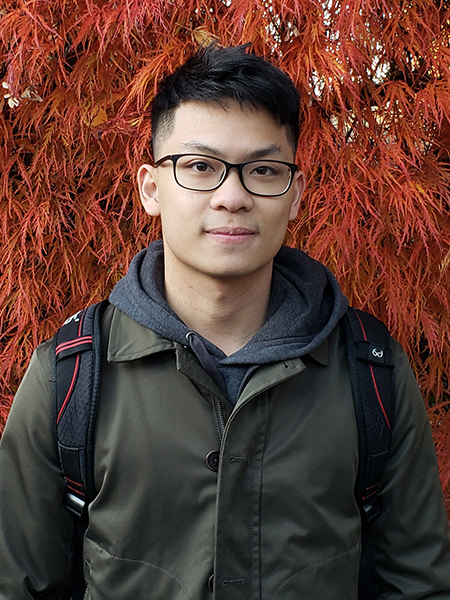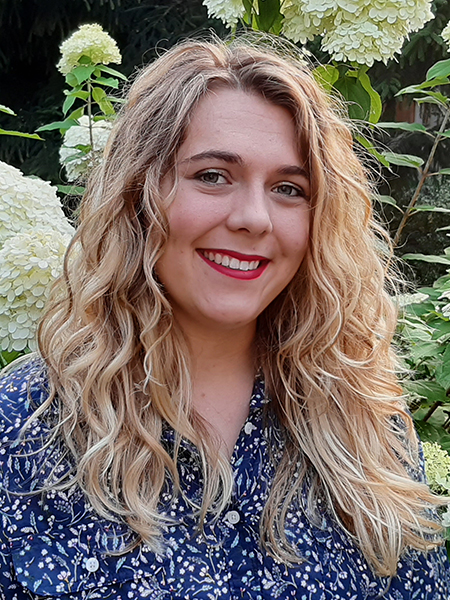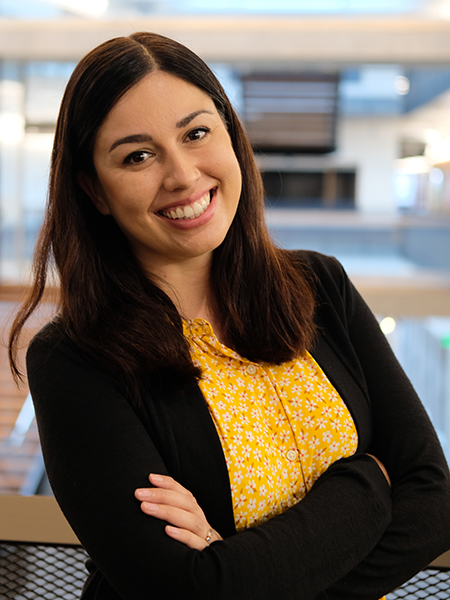For students who are among the first in their families to attend college, the experience of navigating a four-year degree can be daunting. From decoding the campus lingo to overcoming imposter syndrome, the more than 250 undergraduates currently pursuing their bachelor’s degree as first-generation students in the Allen School are breaking down barriers and carving their own paths. We caught up with a few members of our community who are either finding their footing as first-generation students, or have been there, done that, and are happy to share what they learned in honor of the National First-Generation College Celebration taking place today at the University of Washington and across the nation.
Meet undergraduates Andres Eligio and Aaron Pham, graduate student Alyssa La Fleur, and academic adviser Chelsea Navarro — each with an inspirational story to tell about where they have been and where they are going as first-generation college students.
Andres Eligio
Andres Eligio is a freshman from Des Moines, Washington whose parents immigrated from Mexico in 1996 to provide a better life for their children. He is the first in his family to pursue an education after high school. Eligio credits the College Access Now (CAN) program as an important factor in his pursuit of a college degree. CAN helped him navigate and learn about colleges and the application process, while robotics, mathematics, and computer science classes in middle and high school solidified his interest in computer science.
Allen School: What does being a first-generation student mean to you?
Andres Eligio: To me it means facing the challenge of pursuing an education without having your parents’ support. It means working towards a goal which you can’t truly see. It can be scary to try and break away from what your parents have done. But I hope to fulfill all the work they did by coming to this country and take advantage of all the opportunities I am given.
Allen School: What is your favorite part about being an Allen School student?
AE: My favorite part by far of the Allen School is how hard they work to make sure you feel like a part of the community. The faculty are very friendly and provide countless opportunities to make connections and learn more about being a UW student. I almost didn’t go to college. It took me a very long time to decide whether to continue my education after high school or work for my father’s landscaping company. I decided to try. I didn’t think I’d feel like I belonged, but I took part in the CSE Startup, a program for direct admit students that help them get used to life and classes at the UW. Before taking this course, I didn’t feel like I belonged. Now, having completed the program, I feel as if I am a part of the UW and more importantly, meant to be here in the Allen School. I feel confident about the rest of the school year and my success academically.
Allen School: What advice do you have for future first-gen students?
AE: I would tell them that I know it can be scary trying to pursue an education after high school. You can’t necessarily look to your parents for help, and they can only try to understand the struggle of finding the right college and choosing which field to study. Even though it seems hard and confusing, if you truly want to go to college you can do it. Look into your school or programs for support. Talk to counselors and friends. There will always be people to support you. It isn’t easy to leave your parents. Personally, it was really hard for me to leave. I worked hard to support my family, both in my dad’s business and in taking care of my brother. Many of you are in a similar situation, be it helping your parents or taking care of siblings. Your parents have worked really hard to provide you opportunities they didn’t have, and you should take full advantage of it.
Aaron Pham
Aaron Pham, a junior who transferred to the University of Washington in the spring, moved to the United States with his family in February of 2016. Born in Vietnam, he is the oldest child in his family and the first to go to college. His father worked for the U.S. Embassy in Vietnam; when the U.S. government gave him the opportunity to come to the States, the whole family moved to Washington, where Pham began his college career the following year at South Seattle College.
Allen School: What does being a first-generation student mean to you?
Aaron Pham: While it is such an honor, this also comes with challenges and responsibility. I will be a good example to my nephew and my younger cousins. It is a great motivation for me to keep learning, improving and pushing myself out of my own limits to become a successful student.
Allen School: What is your favorite part about being an Allen School student?
AP: My favorite part is the opportunities I have to connect with other friends and professors who also have a great passion for computer science. Studying and working in this environment not only improves my technical coding skills, but also guides me to become a person who wants to make impacts and contribute to the community and society by applying my knowledge and my passion for computer science. Being in the Allen School allows me to reach my full potential.
Allen School: What advice do you have for future first-gen students?
AP: Get involved at school, find your community, connect with a counselor, attend orientation activities, know where to get help on campus, and embrace who you are and don’t compare yourself to others. Everyone has their own weaknesses and strengths — so do you. No one is perfect. We are all here to learn and push ourselves out of our own limits.
Alyssa La Fleur
Alyssa La Fleur, from Monroe, Washington, is a student in the Allen School’s full-time Ph.D. program. She fell in love with computational biology as an undergraduate and is now developing the skills to build a successful research career. La Fleur was homeschooled and attended a co-op before enrolling in Cascadia Community College through the Running Start program in high school. She graduated in the spring from Whitworth University with a triple major in math, bioinformatics and biochemistry.
Allen School: What does being a first-generation student mean to you?
Alyssa La Fleur: It means that I will have greater job opportunities and financial security than my parents.
Allen School: What is your favorite part about being an Allen School student?
AL: So far, my favorite thing has been the friendly community and the diverse fields of study represented in it.
Allen School: What advice do you have for future first-gen students?
AL: Don’t be afraid to ask questions, even if you think they might be stupid. It’s also fine if you don’t know what questions you should be asking in the first place, as you are in a new environment and probably won’t realize what the gaps are in your knowledge right away. Also, if someone ever makes you feel uncomfortable when asking for help, there are plenty of other campus resources to use instead. I particularly recommend asking senior students in your major for advice.
Chelsea Navarro
Chelsea Navarro is an academic adviser at the Allen School focused on serving undergraduate students, including students transferring to UW from two-year colleges. As a first-generation student from San Diego, California, she credits services such as the Educational Opportunity Program (EOP) and Federal TRIO Programs in helping her begin her college career at Palomar Community College before transferring to San Diego State University, where she received her bachelor’s degree in sociology. The dedicated student affairs professionals and advisers that worked with her along the way inspired her to pursue a career in higher education. Navarro subsequently earned a Master’s of Education in student affairs from the University of California, Los Angeles and is proud of being a first-generation student.
Allen School: What does being a first-generation student mean to you?
Chelsea Navarro: Growing up, my biggest ambition was to graduate from high school since it’s an accomplishment that not many people in my family are able to fulfill. My parents met as teenagers and had me when they were teens themselves. My father is a high school graduate and my mom dropped out of school when she was in middle school. I am the eldest of two daughters. One saying that has guided my practice is “remember why you started,” as so much of what I do is rooted in my higher education experience. I got into this field to help others and to hopefully be part of the support network that makes a student successful, like many advisers and faculty were for me when I was a student.
Allen School: What is your favorite part about working at the Allen School?
CN: Working at the Allen School is an opportunity for me to continue to give back as faculty and advisers did for me. Part of my role as an undergraduate adviser at the Allen School is to work with our transfer students, which I absolutely enjoy doing. In many ways, it feels like I’ve come full circle and working at the Allen School is an amazing opportunity for me to continue to help others.
Allen School: What advice do you have for future first-gen students?
CN: When I first started at community college, I was incredibly lost and had a difficult time understanding university policies and interpreting my degree requirements: What is a credit? What happens in a lab? What is an associate’s degree? Is it okay to meet with professors? I’ll never forget the first time I met with an adviser and brought a huge list of questions with me to my appointment. I learned so much in those 30 minutes. Given my experience, my advice would be to encourage first-year, first-generation college students to be up front with the questions they want to have answered. It’s okay to admit that you feel lost and that you need help. As a first-generation student, I often felt like I was the only one going through the overwhelming experience of being the first in my family to go into higher education. Plus, I was scared to talk about my problems because in my mind, an administrator would notice and tell me that my greatest fear was true — they would say that I didn’t belong in higher education. Imposter syndrome is a difficult reality for many first-year, first-generation college students, so I encourage any students going through it to talk about it so they can get the support they need.
We are grateful for the many contributions our first-generation students, faculty and staff have made to the Allen School community! Learn more about the National First-Generation College Celebration here, and activities celebrating UW’s first-generation community here.
Check out our student profiles from last year’s celebration here.






